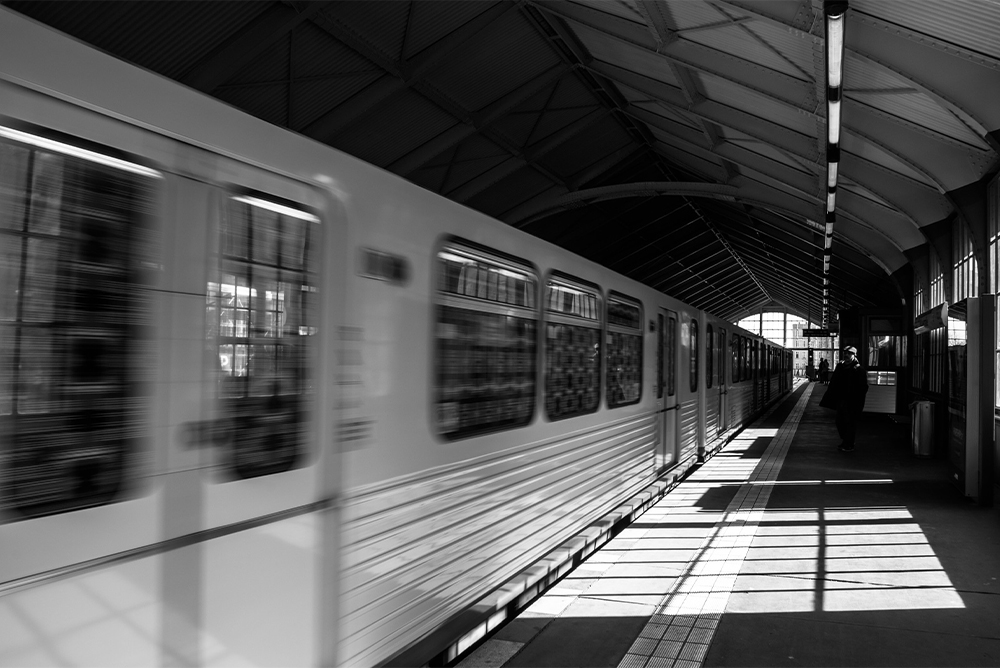
Courtesy of David Almeida/Flickr (CC BY-NC-ND 2.0).
Wie lieblich sind deine Wohnungen
(Johannes Brahms, Deutsches Requiem/Psalm 84)
I
Keusch bewahrt,/ In bescheidener Knospe: In downstairs Berlin bars she meets young men
while machines rip the city’s old seams, laying streets open for new phone lines.
Cranes raise their beaks to the winter sky; the city slips daily into new silhouettes.
Winter rain falling onto the roof of the gold-bricked brewery washes coal-smoke
from the air as the U-Bahn one block over rumbles overhead on high rails
and streetcars rattle below across the cobbles. It has been decades
since iron uniforms marched through here—the click of the recalcitrant key
in the lock of the WC halfway down the brown-and-green stairway
pops like the bullets that pocked the façades of houses’ high faces.
II
in stiller
Ewiger Klarheit
Everything that was once broken shall be healed, the texts say, and the tidied buildings
receive their coats of eggshell-blue or butter-yellow paint. On every block,
a basement storefront opens to offer something new: all-inclusive cruises, cases
of mineral water, cola, beer, housewares, perhaps another dark bar in which to sit.
She has coal delivered to her cellar and watches the men who bring it,
their blue bibbed overalls already dirtied in the early morning. They heave burlap sacks
from the truck’s lip onto their shoulders and clatter down the steps. She holds
their Trinkgeld at the ready in her pocket, unsure if it is enough, listens to the slip
of coals sliding as the men empty their sacks onto the growing pile of dark brown bricks.
III
Wie Wasser von Klippe
Zu Klippe geworfen
When the cold comes, she’ll light coal fires in her porcelain oven, empty ashes
in the courtyard dumpster, walk five flights down to fill her coal-bin. On bitter evenings
she lights a fire and it is still cold when she wakes, then by noon the oven
almost glows with heat. Some days her books seem far away, and she cooks soup
in the enamel pot from her grandmother’s kitchen; the linens she inherited lie stacked
in a wooden cabinet. Her choir performs the Schicksalslied in the brown church
one station to the east: when she sings the opening her grief rises, a note suspended
in coal-scented air. The sun drops behind the brewery earlier every day when she walks down
the quiet street, peering at shuttered windows: such longing behind every pane.
IV
Blindlings von einer
Stunde zur andern
Everything that was broken shall be healed: we know better in the cellar bar
where she drinks to forget the friend who took his life across the sea,
where the tall Irishman with white-bleached hair counts pennies
to buy himself another beer. Nobody knows when phone service will begin. Below
the city the tiled subway stations, now reconnected, lead cold travelers further in.
Backhoes rumble, and men working in the trenches whistle at young women.
The sun drops later now behind the brewery across the street. Winter rains
are waning, spring is on the way, sap rises in the slender street trees.
Even the eggshell-blue paint will fade one day, but still the city mends and mends its seams.
On Sunday mornings men prop their beers between their legs on the S-Bahn’s dirty seats.



